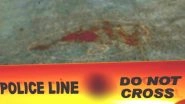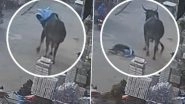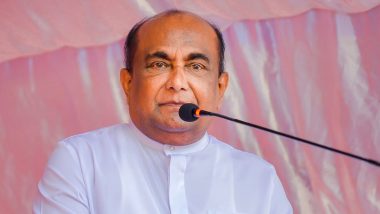Colombo, July 11: The Sri Lankan Parliament will elect the new president to succeed Gotabaya Rajapaksa on July 20, Speaker Mahinda Yapa Abeywardena announced on Monday. The decision was taken during a crucial all-party leaders meeting held earlier in the day. President Rajapaksa is yet to resign formally, however, he informed the Speaker on Saturday that he will quit on July 13. Prime Minister Ranil Wickremesinghe also said that he will step down after a new government is formed.
After receiving Rajapaksa's resignation on Wednesday, Parliament will convene on July 15 to announce the vacancy and will reconvene on July 19 to accept the nominations for the post, Speaker Abeywardena said. A parliamentary ballot will be held on July 20 to elect the new president, he said.
Rajapaksa agreed to bow down to the party leaders' request to resign following the popular uprising on Saturday. Sri Lanka Economic Crisis: Anti-Government Protesters Set Fire to Prime Minister Ranil Wickremesinghe’s Private Residence in Colombo ( Watch Video ).
Under the Sri Lankan Constitution, if both the president and prime minister resign, the Speaker will serve as acting president for a maximum of 30 days.
The Parliament will elect a new president within 30 days from one of its members, who will hold the office for the remaining two years of the current term of President Gotabaya.
President Rajapaksa had appointed Wickremesinghe as prime minister in May after his elder brother Mahinda Rajapaksa was forced to resign amidst growing pressure on the government over the mismanagement of the economy. The cash-starved island nation witnessed a tumultuous day on Saturday when protesters broke into Rajapaksa's official residence in Colombo. About 100,000 protesters amassed outside the president's official residence, demanding Rajapaksa's resignation. Sri Lanka Economic Crisis: From Mock Wrestling on PM's Bed to Sinhalese Bella Ciao, Check Viral Videos from Sri Lanka Protests.
Video broadcast on Sri Lankan television and on social media showed protesters entering the President's House - Rajapaksa's office and residence in the commercial capital of Colombo - after breaking through security cordons placed by police. Protesters did not spare Prime Minister Wickremesinghe despite his offer to resign and set on fire his private residence in an affluent neighbourhood in the capital.
Sri Lanka, a country of 22 million people, is under the grip of an unprecedented economic turmoil, the worst in seven decades, leaving millions struggling to buy food, medicine, fuel and other essentials. Tens of thousands have taken to the streets in recent months, calling for the country's leaders to resign over accusations of economic mismanagement.
The country, with an acute foreign currency crisis that resulted in foreign debt default, had announced in April that it is suspending nearly USD 7 billion foreign debt repayment due for this year out of about USD 25 billion due through 2026. Sri Lanka's total foreign debt stands at USD 51 billion.
(The above story is verified and authored by Press Trust of India (PTI) staff. PTI, India’s premier news agency, employs more than 400 journalists and 500 stringers to cover almost every district and small town in India.. The views appearing in the above post do not reflect the opinions of LatestLY)













 Quickly
Quickly


